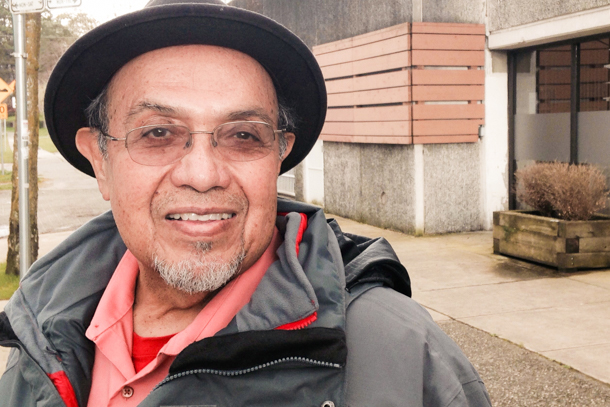Leno Rose-Avila remembers the first time he met someone who narrowly avoided the electric chair.
While attending a debate three decades ago, a United States district attorney stated that nobody on death row had ever been found innocent.
"I'm innocent," protested a man in the audience, Rose-Avila recalls, "and I just got off death row."
The black ex-convict, Joseph Green Brown, had been exonerated just 15 hours before his scheduled execution when authorities admitted they knew the witness who helped convict him was lying.
(In a strange twist, Brown, who became an anti-capital punishment campaigner, was convicted of different charges -- the second-degree murder of his wife -- in 2013 and sentenced to 15 years in prison.)
Today, Rose-Avila heads the anti-execution group Witness to Innocence, a death row survivor-led organization founded by Helen Prejean, the nun depicted in Dead Man Walking.
It's now been 40 years since Pierre Trudeau's government abolished the death penalty in Canada, though only by a razor-thin seven votes.
"Those who vote against the bill," the prime minister warned MPs in 1976, "cannot escape their personal share of responsibility for the hangings that will take place if the bill is defeated."
Rose-Avila is in Vancouver tonight to call on Canadians -- and Justin Trudeau -- to push their southern neighbours to end the "inhuman" practice.
He sat down with The Tyee to explain why.
The Tyee: Canada hasn't had the death penalty for decades. There's a sense that we can't do anything -- it's not our moral responsibility.
Leno Rose-Avila: It is your moral responsibility. Other people pressured Canada when Pierre Trudeau eliminated it. Now you have an opportunity to do that. People in Europe for years have been working to abolish the death penalty in the U.S. People used to ask me, 'What do Europeans have to do with it?' Well, they've actually gotten people off of death row, and they stopped the sale of all the chemicals used to execute people from European companies.
We're your neighbours, we're doing something wrong, and you've got to correct us. And just like you would in your city, if you saw somebody was abusing their spouse, you'd report them. If you saw somebody abusing their animals, you'd report them. That's a responsibility you have. Here, you have your neighbouring country killing its own citizens. It would be wrong for Canadians not to say, 'Stop it. We know you're a smarter country. We know you can do better.'
Talk about the racial overtones of the death penalty. The majority of people on death row are minorities.
That's because we put more emphasis on what the colour of the victim was. If the victim was Anglo-Saxon white -- and particularly if the [accused] is a person of colour, primarily black -- you're more likely to get the death penalty. White people also get the death penalty; [those who do are] low income and don't have the proper representation. So the two factors are economics and race. And race is a bigger factor.
Do you think there's more popular interest in wrongful convictions through podcasts like Serial or shows like Making a Murderer? There's a sense in both those cases that there was a prosecutorial zeal to get someone and to railroad them through the system.
For every one of our members who's been found innocent, there was prosecutorial or police misconduct. A lot of times, they know they have the wrong guy. But they have enough that in a court of law, who are you going to agree with -- the prosecutor and police, or somebody they say killed somebody? Most of the defendants don't have good attorneys.
Right now we have prosecutors and police who are coming to us saying, 'We've made mistakes. I want to help you.' We even have wardens who oversaw executions who [now] say, 'It was wrong. I saw innocent people being executed and even the guilty should not be executed.'
Was there something for you, personally, that made this issue hit home for you?
In 1985, I joined Amnesty International in the South where we have a lot of death penalty cases. The deeper I got into it, the more reasons I found to work on it. In 1986 or 1987, I met my first innocent person that came off death row -- he came within four hours of being executed -- Shabaka, better known as Joseph Green Brown.
What was he like? Was he quite angry about his experience?
What struck me most about Shabaka was his sense of humour, his calmness and even though he was emotional, he wasn't super angry -- that they didn't let him out of death row to give a kidney to his brother when his brother needed it to survive, and died. That they didn't let him out for his mother's funeral. That he came within hours of being executed.
The heroes of the American judicial system are those people who survive prison, especially the exonerated men and women of death row.
Interview edited for clarity and length. Leno Rose-Avila speaks March 24, at St. James Community Square in Vancouver (3214 West 10th Ave.) at 7:30 p.m. ![]()
Read more: Rights + Justice, Federal Politics
















Tyee Commenting Guidelines
Comments that violate guidelines risk being deleted, and violations may result in a temporary or permanent user ban. Maintain the spirit of good conversation to stay in the discussion.
*Please note The Tyee is not a forum for spreading misinformation about COVID-19, denying its existence or minimizing its risk to public health.
Do:
Do not: